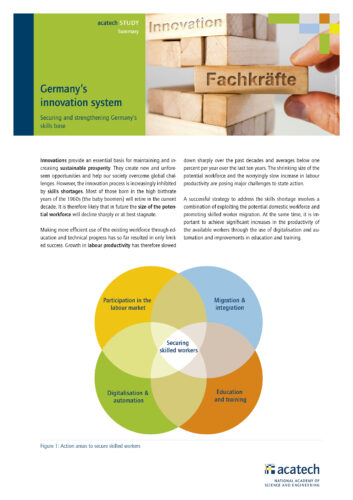Germany’s Innovation System

Innovation is essential for the competitiveness and growth of the German economy, and it plays a key role in tackling global challenges; for example, in climate action. Sustainable prosperity is not possible without innovation.
How well new ideas can be developed, realised and made available to society by way of suitable business models depends on the contributions made by the many stakeholders within the innovation system. These, in turn, depend on a policy framework that can either foster innovation or tend to preserve the status quo.
Every year, the project “Germany’s Innovation System” focuses on one area in which ground-breaking decisions on the definition of the framework for innovation are to be made. The empirical basis for this analysis is the collection of available data. Building on this, qualitative interviews are held to obtain the perspectives of various stakeholders from science, business and society, and the results compiled. Based on the findings, options are identified to define a policy framework that is conducive to innovation and thus enhances prosperity.
Topics of focus
1. Securing and strengthening Germany's skills base
To maintain and enhance Germany’s innovative strength, it is crucial to secure the supply of skilled labour across the board. The formulation of a suitable regulatory framework centres on labour market potential – both at home and abroad – the potential of digitalisation and automation as well as education and training.
acatech STUDY Germany’s Innovation System: Securing and strengthening Germany’s skills base
 The skills shortage is already a major challenge – indeed an existential threat for some businesses – and, on top of that, the baby boomer generation will soon be leaving the labour market. What can be done? In a STUDY published in June 2023, acatech – National Academy of Science and Engineering assesses the possibilities presented by labour market participation, migration, digitalisation and education. Germany needs to bring about change in all four of these areas, and such change must involve the dismantling of legacy structures. To secure more foreign skilled workers, political commitment to economic migration is required, as is a bureaucratic culture that is service-oriented and enabling. To the study
The skills shortage is already a major challenge – indeed an existential threat for some businesses – and, on top of that, the baby boomer generation will soon be leaving the labour market. What can be done? In a STUDY published in June 2023, acatech – National Academy of Science and Engineering assesses the possibilities presented by labour market participation, migration, digitalisation and education. Germany needs to bring about change in all four of these areas, and such change must involve the dismantling of legacy structures. To secure more foreign skilled workers, political commitment to economic migration is required, as is a bureaucratic culture that is service-oriented and enabling. To the study
2. Increase the efficiency and agility of public administration
Control over and enforcement of the legislative framework is the responsibility of public administration. Complicated application procedures, sluggish processes, extensive conditions and insufficient digitalisation all too often hamper and prevent innovations.
3. Interlinking civilian and military innovations
The turning point following the Russian attack on Ukraine also has consequences for the German innovation system. Civil and military innovation ecosystems have so far been largely decoupled. A stronger integration of civil and military innovation activities (dual use) offers the potential to leverage synergy effects and gain innovative strength.
Members of the project group
- Univ.-Prof. Dr. Dr. Dr. h.c. Ann-Kristin Achleitner
Technische Universität München - Dr. Gerhard Kussel
acatech - Deutsche Akademie der Technikwissenschaften - Sandra Pavleka
acatech - Deutsche Akademie der Technikwissenschaften - Prof. Dr. Dr. h.c. Christoph M. Schmidt
RWI-Leibniz-Institut für Wirtschaftsforschung







